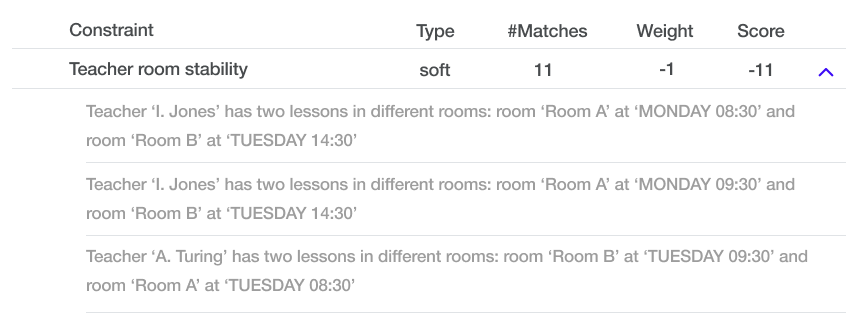Published in Blog
Newsletter 3: Explainable AI for Planning Optimization
Discover how Timefold's ScoreAnalysis API builds trust in automated planning. And don't forget to join Timefold's first AMA on Youtube Live on March 19th!
Do users trust your planning automation from day one? When you solve a planning problem - for example vehicle routing or maintenance scheduling - and show the optimized solution to the end-users, do they immediately like the schedule? Do they see the value in a heartbeat? Or are they extremely skeptical?
Typically, it is the latter. Because the new planning will drastically affect their lives on a daily basis: just one missing hard constraint could put them in a world of trouble.
So, how can we prove our schedule’s value? With a visualization: show the schedule in rows/columns, or on a map. But for big schedules, a visualization doesn’t show you the forest for the trees. And users really just need to verify if all constraints are taken into account.
This is where Timefold’s new ScoreAnalysis API comes into play. It explains the output of the solver AI. It breaks down the score - a mathematical concept - into business-relevant constraints. It shows you which of the trees in the forest are rotten.
Here’s an example of a ScoreAnalysis on a school timetabling schedule with a score of 0hard/-8soft:

This confirms that there are no room conflicts, student group conflicts or teacher conflicts: the schedule is feasible.
It also shows 11 incidents of teachers having to switch rooms. And 3 cases of teachers benefitting from back to back lessons. The ScoreAnalysis API can even reveal when the teachers need to switch rooms, by showing the 11 matches:

With this info, your users start to trust your automated planning.
The ScoreAnalysis API is available since Timefold Community 1.4.0. Call the SolutionManager.analyze() method to get a ScoreAnalysis instance:
var scoreAnalysis = solutionManager.analyze(solution)This method returns quickly. Send the result to your frontend as-is: it is JSON friendly unlike our old API’s. To learn more, read our documentation or Lukas’s blog or check out the use-cases in the timefold-quickstarts repository.
Timefold AMA - vehicle routing and maintenance scheduling
When: March 19th at 08:00 PDT (San Fransisco) / 11:00 EDT (New York) / 15:00 GMT (London) / 16:00 CET (Paris/Brussels/Berlin)
Dive into the world of vehicle routing and maintenance scheduling with our Timefold Ask Me Anything (AMA) session on March 19th. This event is your chance to engage in in-depth discussions about these topics, directly with the Timefold team. Join us for an AMA with Geoffrey De Smet, creator of OptaPlanner and Co-founder of Timefold, and Lukáš Petrovický, our Timefold Solver Lead Engineer.
How to Participate
No sign-up required! On March 19th, join us on YouTube live here. Pro tip: follow our YouTube channel to get notified when we go live.
Have Questions? Let's Hear Them!
Got questions about vehicle routing, maintenance scheduling, or any other question? We'd love to hear from you in advance! Submit your questions now using this form to ensure they get prioritized during the AMA. Of course, you're also welcome to ask questions live during the event.
Blog
Tournament scheduling with Timefold.
2024 is an important year for soccer as it marks the 48th Copa América and the 17th EUFA EURO 2024. That made us think, can we use Timefold to create a good and fair schedule, complying with all the rules? To create this demo tournament schedule, we use Java with Quarkus.
Use multiple solvers in the same application
How can you solve two different planning problems in the same application, potentially in sequence? With two SolverManager instances, one for each problem. In the article, we'll show you how to configure and inject two SolverManager instances in a single application.
Timefold Solver Community Edition 1.7.0. full release notes
A feature often requested by our community is the possibility to inject more than one SolverManager in Quarkus and Spring Boot applications. We’ve heard this and 1.7.0. marks the release of it. Read more in the blog post by Frederico Gonçalves.
We're excited to see the innovative solutions you'll develop with this capability.
In addition to this we focused on bugfixes, improvements to documentation and to the quickstarts.
Here you can find all previous releases of Timefold Solver.







